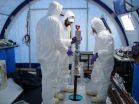The study of 5,216 Kaiser Permanente Southern California patients found that those who received an automated reminder were 1.6 times more likely to fill prescriptions for cholesterol-lowering statins than those who didn't receive a reminder. Informational and encouraging phone calls were automatically generated if a patient did not pick up his or her medication within one or two weeks of a doctor's appointment where a prescription was written. One week after the telephone call, researchers sent a reminder letter to patients who still had not picked up their prescription. When systems for automated outreach exist, the expense of outreach is relatively small. Expenses for both these prompts totaled $1.70 per participant in the study. After the intervention, the percentage of patients who picked up their prescriptions increased from 26 to 42 percent.
"Getting patients to take the well-proven medicines their physicians prescribe for them will ultimately reduce their risk of heart attacks and stroke," said Stephen F. Derose, MD, of the Kaiser Permanente Southern California Department of Research & Evaluation. "This automated intervention is a good way to very efficiently reach a large number of people and improve their health outcomes."
Medication nonadherence occurs when a patient does not follow a clinically prescribed medication course, endangering his or her own health and possibly necessitating more aggressive treatment or hospitalizations later. Previous studies estimated that in the United States each year medication nonadherence contributes to approximately 125,000 deaths and costs the health care system $290 billion. One in three patients prescribed a medication by their health care provider never pick it up from the pharmacy, and, among those who do, nearly 3 in 4 Americans do not take prescription drugs according to providers' orders.
Although this study examined medication adherence exclusively among patients at Kaiser Permanente Southern California receiving their first prescription for a statin drug, the low-cost method is likely to be viable for large populations, other chronic conditions, and other medications. Based on the results of the study, Kaiser Permanente Southern California implemented a new regional outreach program in April 2012. The program has sent reminders to about 2,200 members each month.
"Given the prevalence of the problem, especially among patients with chronic conditions, minor improvements in medication adherence among groups of people should yield significantly better health outcomes for patients and savings for hospitals and health systems," said Derose.
Kaiser Permanente can deliver transformational health research in part because it has the largest private electronic health system in the world. The organization's integrated model and electronic health record system securely connect 9 million people, 533 medical offices, and 37 hospitals, linking patients with their health care teams, their personal health information, and the latest medical knowledge. It also connects Kaiser Permanente's epidemiological researchers to one of the most extensive collections of longitudinal and de-identified medical data available, facilitating studies and important medical discoveries that shape the future of health and care delivery for patients and the medical community. This research is a part of Kaiser Permanente's broader efforts to understand and prevent medication nonadherence. Previous Kaiser Permanente research includes:
A study of 12,061 men and women in Kaiser Permanente Colorado that found patients whose pharmacies are linked to their electronic health records are more likely to pick up their prescriptions. (Journal of General Internal Medicine, 2011)
A Kaiser Permanente Northern California study that found patients who obtained new statin prescriptions via a mail-order pharmacy achieved better cholesterol control during the first year of therapy. (Journal of General Internal Medicine, 2011)
A first-of-its-kind study that found buying mail-order medications may encourage patients to stick to their doctor-prescribed medication regimen. (American Journal of Managed Care, 2010)
###
This study was funded through a collaboration with Merck Sharp & Dohme Corp., a subsidiary of Merck & Co., Inc., Whitehouse Station, NJ.
Other authors of the paper include: Kelley Green, RN, PhD, T. Craig Cheetham, PharmD, MS, Vicki Chiu, MS, Teresa Harrison, SM, Kristi Reynolds, PhD, MPH, Southida Vansomphone, PharmD, and Ronald D. Scott, MD of Kaiser Permanente Southern California; Elizabeth Marrett, MPH, and Kaan Tunceli, PhD, of Merck, Sharp & Dohme Corp.
About the Kaiser Permanente Southern California Department of Research & Evaluation
The Department of Research & Evaluation (R & E) conducts high-quality, innovative research into disease etiology, prevention, treatment and care delivery. Investigators conduct epidemiology, health sciences and behavioral research as well as clinical trials. Areas of interest include diabetes and obesity, cancer, HIV/AIDS, cardiovascular disease, aging and cognition, pregnancy outcomes, women's and children's health, quality and safety, and pharmacoepidemiology. Located in Pasadena, Calif., the department focuses on translating research to practice quickly to benefit the health and lives of Kaiser Permanente Southern California members and the general population. Visit www.kp.org/research.
About Kaiser Permanente
Kaiser Permanente is committed to helping shape the future of health care. We are recognized as one of America's leading health care providers and not-for-profit health plans. Founded in 1945, our mission is to provide high-quality, affordable health care services and to improve the health of our members and the communities we serve. We serve approximately 9 million members in nine states and the District of Columbia. Care for members and patients is focused on their total health and guided by their personal physicians, specialists and team of caregivers. Our expert and caring medical teams are empowered and supported by industry-leading technology advances and tools for health promotion, disease prevention, state-of-the art care delivery and world-class chronic disease management. Kaiser Permanente is dedicated to care innovations, clinical research, health education and the support of community health. For more information, go to www.kp.org/newscenter.
END



